Our 2020 in Review
…what a year.

This year has been very busy and productive for elementary—and at the same time, it feels like it has flown by, thanks in large part to our team being isolated at our respective homes since March due to COVID-19. Let’s take a look at what all we accomplished this past year despite 2020 being, well, 2020.
Updates to elementary OS 5.1 Hera
We regularly released feature and fix updates to elementary OS 5.1 Hera for the first half of the year, until shifting our focus more significantly to elementary OS 6 in August. Still, AppCenter app updates and minor OS updates are being released, along with continued security updates to underlying components from Ubuntu.
Our first batch of updates to elementary OS 5.1 was a developer-focused feature update for Code, Terminal, and Files. Thanks to our new release process from the end of 2019, we also started building more regular OS 5.1 ISOs in 2020 starting with 5.1.2—which included the Hardware Enablement (HWE) stack and an important sudo fix from Ubuntu—and including 5.1.7 which mitigated the “boothole” vulnerability.
Throughout the year we continued to publish updates; we wrote about what we delivered in February, March, April, May, June, and July. These brought new features, performance improvements, bug fixes, and translations to almost everything.
Design Updates
Since elementary OS and our apps operate on a more rolling release schedule, we don’t always wait until major OS releases for feature and design updates. This year we worked on a handful of design updates and initiatives that were delivered to OS 5.1 users as they were ready.
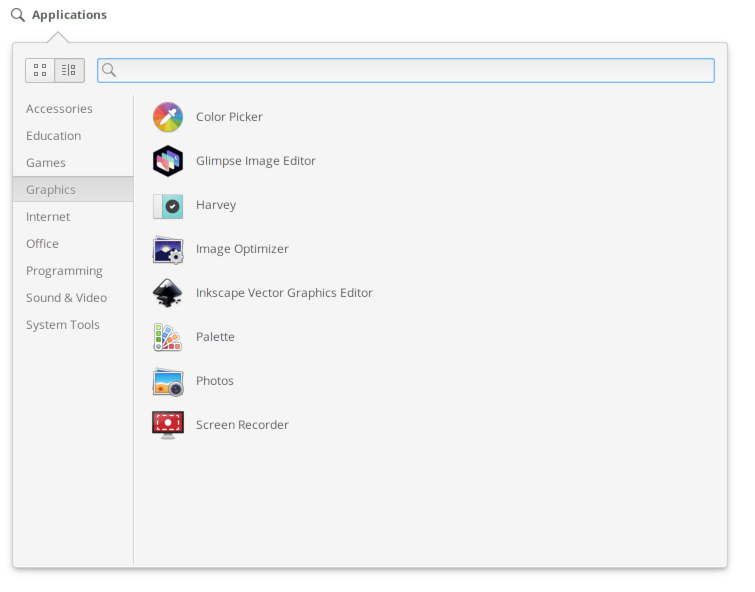

Left: Redesigned Applications Menu category view | Right: New “Natural Copy/Paste” setting in Terminal
We debuted a new Applications Menu category design along with multi-touch support in the grid view. In Terminal, we added the “Natural Copy/Paste” setting to play more nicely with some command-line apps.
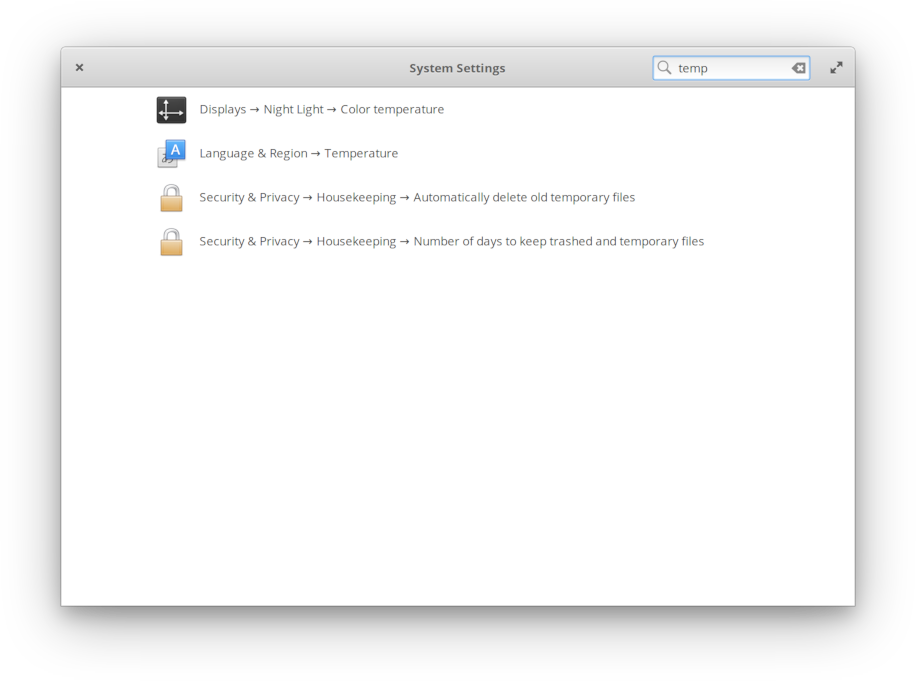
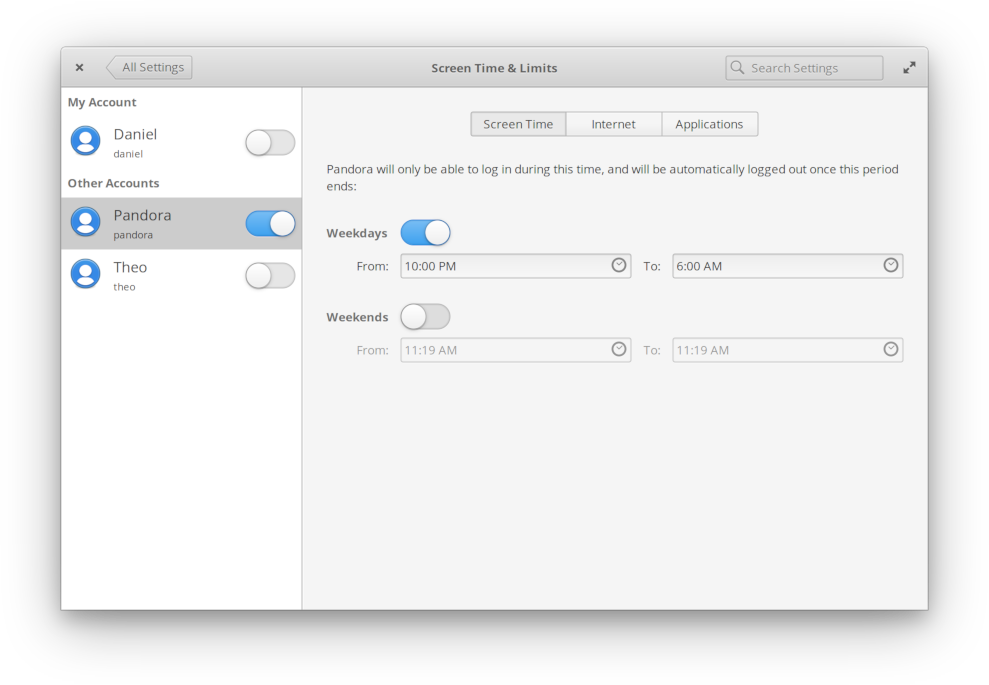
Left: Redesigned search in System Settings | Right: New Screen Time & Limits settings
We redesigned search in System Settings, exposing deep searching for individual settings, bringing it more in line with search in the Applications Menu. We reworked Parental Controls into new Screen Time & Limits settings with a focus on making it easier to implement personal digital well-being features.
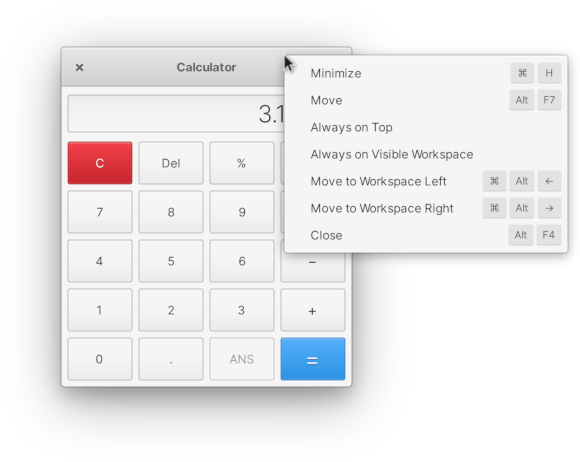
We’ve also continued our organization-wide efforts like Accessibility Features Are Just Features and Keyboard Shortcut Discoverability with several updates to System Settings, apps, and the desktop experience itself.
There’s a whole bunch more from throughout the year; check the #updates tag here on the blog for month-by-month write-ups.
AppCenter
This year we’ve really focused on delivering constant improvements to AppCenter. In April, we improved performance and updated how extensions to apps are shown. In May we delivered substantial performance, stability, keyboard, and proxy improvements—plus reduced authentication fatigue by enabling updates without administrator permissions.
We also announced AppCenter for Everyone, smashing the crowdfunding goal on just the third day of the campaign. By the end of the campaign we hit 190% funded. Of course, the global COVID-19 pandemic hit the US in March; as a result, we had to make the difficult decision to postpone the in-person AppCenter for Everyone sprint until it’s safe to meet in person. We held a short remote sprint that helped us prototype some design, web, and desktop work, but ultimately our scope of work was too ambitious for this format and required too much real-time collaboration to be practical remotely. We still plan to hold an in-person sprint in the future to achieve this work.
Still, AppCenter has steadily improved, and we’ve been working on many of the underlying components in the meantime. We currently have 188 curated apps on AppCenter, averaging over two new curated apps per month this year. And as part of getting AppCenter ready for our ambitious AppCenter for Everyone plan, we’ve continued to improve support for Flatpak—which means elementary OS is compatible with the hundreds of cross-platform apps available from remotes like Flathub out of the box.
Shifting Focus to elementary OS 6
In August, we started talking a bit more about elementary OS 6. This marked our internal shift in development priority from 5.1 to 6, and allowed us to be more confident in teasing planned features for the elementary OS 6 release—plus, we launched our Early Access program for GitHub Sponsors to get their hands on daily images.
The effort to produce daily builds has been a long ongoing project itself this year that benefits both sponsors and us internally at elementary thanks to the hard work of Blake Kostner, Keli Grubb, and David Hewitt streamlining, documenting, and constantly improving our build processes.
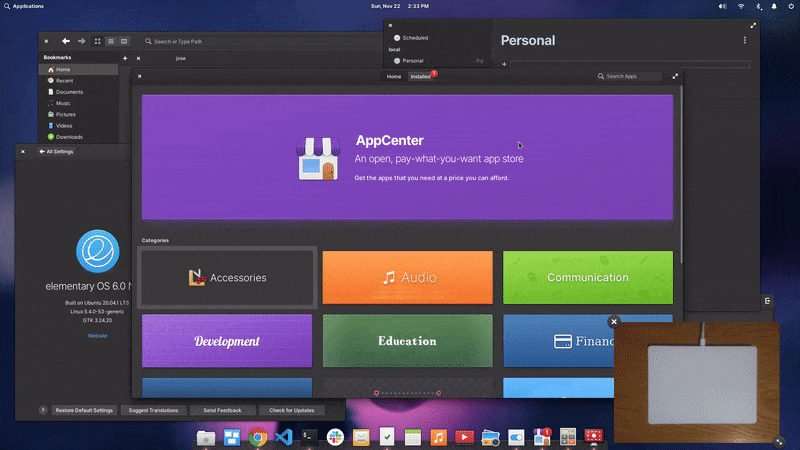
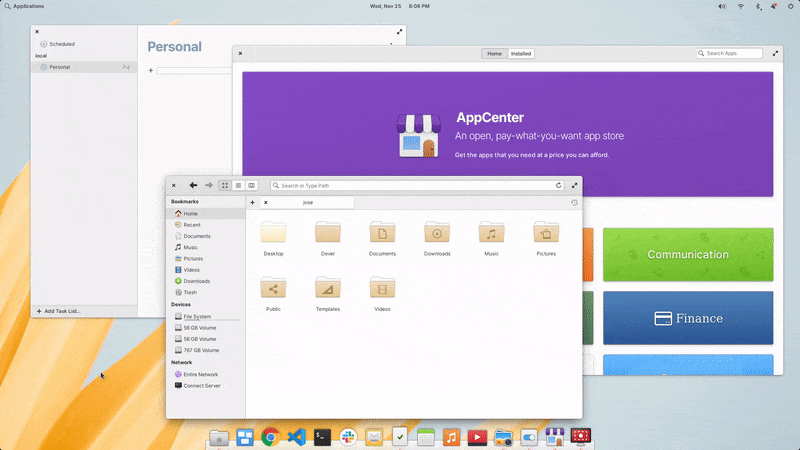
Throughout the year we’ve also been working on new features, new apps, and revamped apps to debut in elementary OS 6. We also wrote about the technology and platform changes coming, shared some details about and a better look at our dark style, and finally, showed off our progress with multi-touch gestures.
And of course, there will be more blog posts to come in the new year about all the new features and improvements coming in elementary OS 6.
Hardware
This year has been huge for elementary OS on hardware. On the experimental side of things, we announced Early Access builds for both Pinebook Pro and Raspberry Pi. These are both ARM-based devices, which is a departure from the typical 64-bit AMD/Intel hardware we target—but we expect this work to be important as we see more focus on ARM on the horizon.


Left: Pinebook Pro | Right: Raspberry Pi 4
But perhaps more importantly, we launched our OEM program and debuted three retailers of elementary devices throughout the year: Laptop with Linux, Star Labs, and Slimbook.
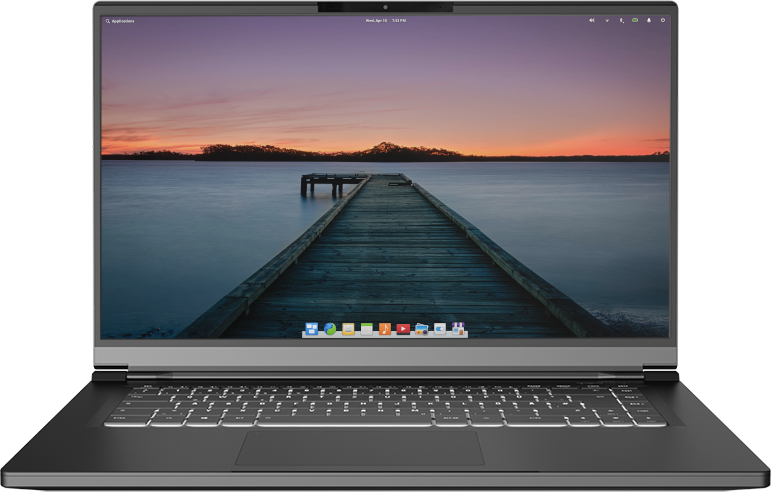
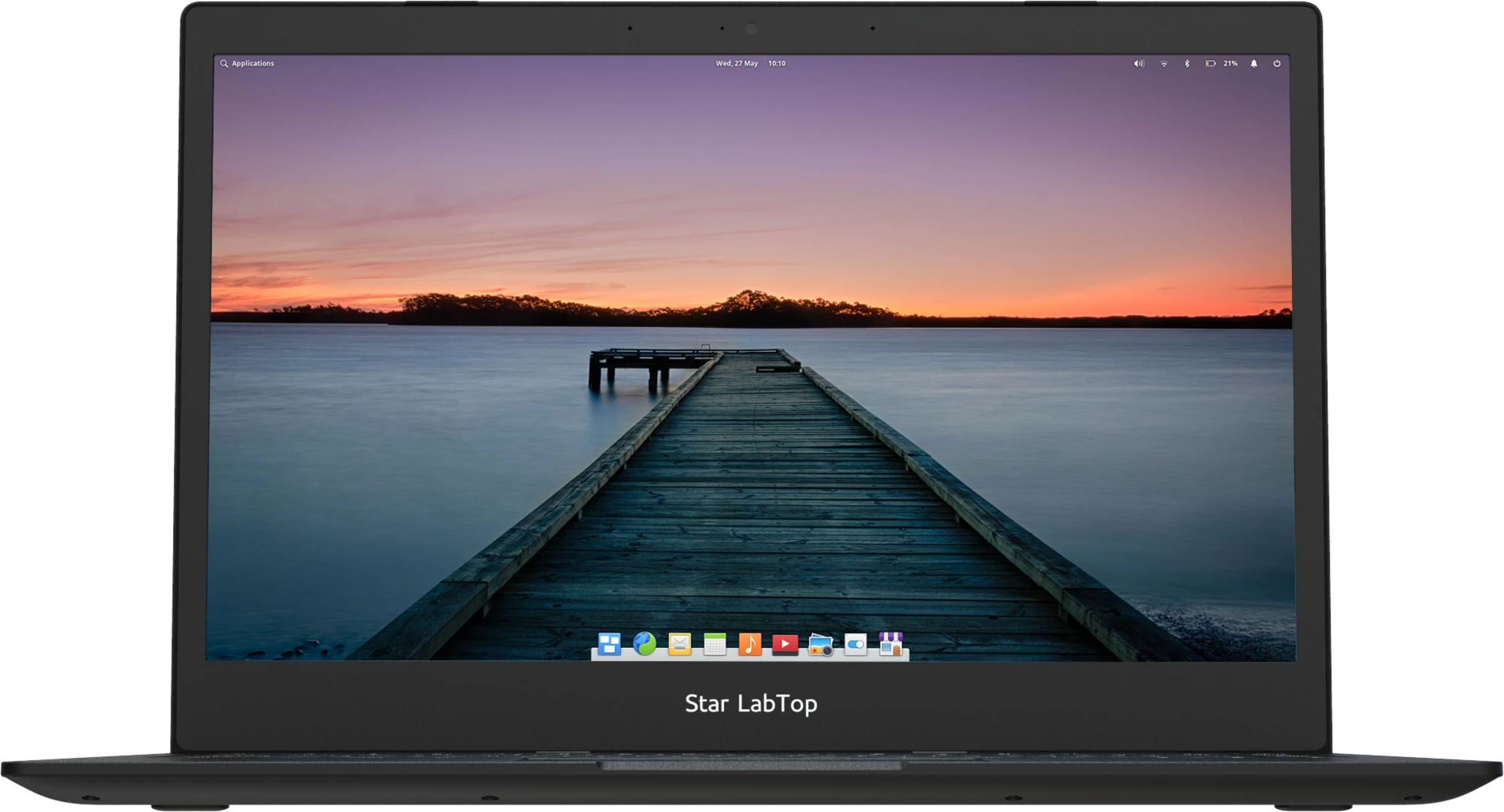
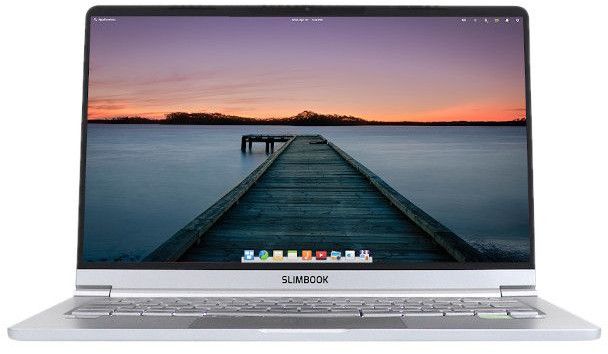
Left: Tongfang Ryzen laptop from Laptop with Linux | Center: Star LabTop Mk IV from Star Labs | Right: Slimbook Pro X
Overall, this year will go down as a huge milestone and new chapter in our story thanks to our work with hardware enablement and device manufacturers. It all ties into our long-term effort of making elementary OS more “gettable” and getting it into the hands of more people.
GitHub Sponsors
This year we joined GitHub Sponsors, a way to fund open source projects directly on GitHub. And it’s been very successful, in large part thanks to our Early Access program using GitHub Sponsors for authentication.
You may recall us talking about “bug bounties” in the past: throwing money at specific issues to fund the developers who deliver features or fixes. In the long term, however, bug bounties have not been successful; drive-by bounties add little incentive for developers, large bounties encourage developing things without first thinking through the problem, and the logistics of multiple people both contributing money and claiming to solve a bounty are a nightmare. To top it all off, Bountysource announced some drastic and hostile policy changes earlier this year that led us to re-think our use and recommendation of their platform.
Thankfully, the GitHub Sponsors model is a much better fit and lets open source projects direct funds as needed. This year we’ve hit 573 sponsors funding about $5,000 per month. We use these sponsorships to help pay for our web and builds infrastructure and to pay both employees and contractors to contribute back to elementary OS itself.
Web Updates
This year we developed and released a new Releases tool to track our 100+ open source projects and their development and release statuses. It’s been immensely helpful in our regular updates to elementary OS 5.1, even if right now it looks a bit scary since there is so much unreleased development targeting elementary OS 6.
After a month of trialing it, we completed our migration from Google Analytics to Plausible. This effort has been important to improving the privacy of visitors to elementary websites, as well as increasing transparency since anyone can now see all of the stats about our websites—including OS download numbers.
We ported a substantial amount of older blog content from our old Medium publication and Tumblr, centralizing it into one place fully owned by us—and without advertisements or tracking. We also added search to the blog to make it easier to dig through some of that older content.
On the documentation side of things, we moved from a custom solution to GitBook along with a new docs.elementary.io domain. This makes it easier for anyone to contribute to our documentation right on GitHub. At the same time, we’ve added and improved much of the developer documentation, such as adding a new section for Actions.
…and more!
As we mentioned last year, a goal for this year was to work with a professional business developer to work on improving the organization and operations side of elementary. After she graciously volunteered her time for several months, we’re happy to announce we’ve hired Liz Kecso to help manage the organization and finances.
I was interviewed by Linux++ earlier this year about elementary, which ended up being a great read. I also wrote a fun article about how to use elementary OS to revitalize a Mac or Windows PC—a great resource to share with friends and family this holiday season.
Lastly, you may have noticed we started doing more frequent live streams on our YouTube channel. We’ve been focusing on sharing more behind-the-scenes content and making better use of video, so be sure to subscribe there to catch the next one! For those not as keen on YouTube, we have also mirrored our channel to Odysee (powered by LBRY); you can follow us there as well.
Goals
Last year we started documenting our goals in our #year-in-review posts; let’s check on our goals for 2020 and see how we did—and then set some new ones for 2021.
Looking back: 2020
We planned to attend both GUADEC and LAS in person this year; thanks to the COVID-19 pandemic, both were adapted to online-only conferences. But we still attended, watched talks, and enjoyed time with friends and co-contributors. We also planned to organize an in-person sprint; again, we switched to a remote AppCenter sprint after postponing the in-person sprint. Still, not too bad considering what 2020 threw at us!
We planned to double-down on organization goals, and that’s been a huge success this year; we’ve been (virtually) meeting monthly to go over these goals and keep things on track. This work is part of what made our work with OEMs and GitHub Sponsors so successful, and the catalyst for more live streams and video content.
We made progress on Flatpak, sandboxing, and Portals in 2020 as we had planned. We now have Flatpak builds worked into our continuous integration testing, we’re shipping a Flatpak app and remote in elementary OS 6 builds by default, and we’ve made progress on the sandboxed Portal APIs required for good Flatpak integration. This work is ongoing, but it is going well.
Our goal to improve multi-touch gesture support in 2020 has been a success, as we have covered in detail previously. Similarly, a goal to support more personalization in elementary OS is coming to fruition with elementary OS 6.
Lastly, we had a goal to release elementary OS 6 in 2020. Obviously, that didn’t happen, though we made a good amount of progress there. This was mostly thanks to COVID-19 delaying a massive amount of the work we had planned to accomplish in person, causing us to re-evaluate what would make a 6.0 release special—and what to save for a 6.1 release in the future. We feel that we’ve better scoped this out and are confident we can deliver 6.0 in 2021.
Looking ahead: 2021
What’s coming in 2021, and what do we hope to accomplish? Here are some goals we’re putting down for the next year:
Launch a revamped retail store with a larger variety of items, more frequent design drops, etc. Our current store is a huge pain to manage, and we’ve been playing with building a new one. We hope to launch it and the new product design process in 2021, along with those new retail products like art prints and more clothing options!
Work with more hardware retailers and launch at least one partner device. As we’ve mentioned, hardware has been huge in 2020—and we hope to continue the momentum into 2021. More retailers means more options when purchasing a device with elementary OS, and a partner-tier device would be another significant milestone.
At least one in-person sprint since we had to postpone in 2020 due to COVID-19. Hopefully things get more under control in 2021, and it is safe to gather to finally do our in-person sprint.
Develop a Flatpak release process for first-party apps to replace our current Debian-package and PPA-based processes. Similarly, we hope to ship more apps as Flatpaks by default in elementary OS this year, bringing benefits of sandboxing and dogfooding the same technology we’ll be asking third-party developers to use.
And finally, we have a goal to release elementary OS 6 in 2021—I know, that almost sounds like a release date—even if we have to delay some originally-planned features to a 6.1 update later on.
Thank You
To close out 2020 we’d like to offer our greatest thanks to all of our supporters, backers, and customers both from this calendar year, and from the past decade or so of elementary being a thing. All of your contributions—whether code, design, funding, translations, or otherwise contributing to the community—have made elementary what it is today.
If you’d like to help build and improve elementary OS for the next year, decade, and beyond, don’t hesitate to Get Involved.
We’re accepting limited sponsors for the elementary Blog. View our public analytics and learn more if you are interested.



